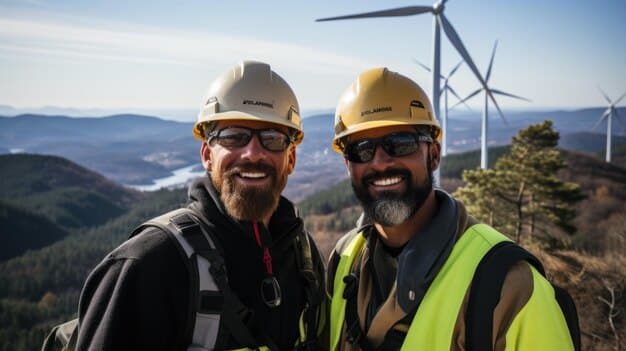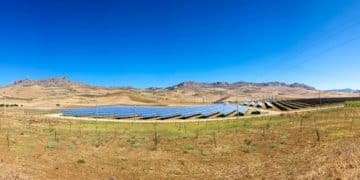Ensuring a Just Transition for Fossil Fuel Workers in the US

Ensuring a just transition for workers in the fossil fuel industry in the US involves comprehensive strategies such as retraining programs, community investment, and social safety nets to support affected individuals and regions as the country shifts towards cleaner energy sources.
The shift towards sustainable energy is reshaping the American economy, and it’s essential to address the impact on workers in the fossil fuel industry. How can the US ensure a just transition for workers in the fossil fuel industry, providing them with opportunities and support as we move towards a cleaner energy future?
Understanding the Need for a Just Transition
The transition away from fossil fuels is crucial for mitigating climate change, but it also presents significant challenges for workers and communities that rely on the fossil fuel industry. A just transition aims to minimize the negative impacts of this shift and ensure that no one is left behind.
This involves recognizing the contributions of these workers and providing them with the resources they need to adapt and thrive in a new economy. It’s not just about switching energy sources; it’s about building a more equitable future for everyone.

The Economic Realities of Transition
Many fossil fuel workers face job losses and economic uncertainty as demand for fossil fuels declines. Understanding the full scope of this economic impact is the first step in designing effective support programs.
These communities often lack diversified economies, making them particularly vulnerable to the effects of transitioning away from fossil fuels.
- Job Displacement: The closure of coal mines and power plants directly affects employment rates.
- Economic Downturn: Reduced tax revenues can impact local schools, infrastructure, and other essential services.
- Skill Gaps: Workers may lack the skills needed for jobs in the renewable energy sector or other emerging industries.
Addressing these economic realities requires a multi-faceted approach, including retraining programs, investment in new industries, and support for local businesses.
Investing in Retraining and Education Programs
One of the most effective ways to ensure a just transition is to invest in retraining and education programs. These initiatives can equip workers with the skills they need to succeed in the renewable energy sector and other growing industries.
By focusing on in-demand skills and providing access to quality education, these programs can help bridge the gap between current skills and future job opportunities.
Targeted Skills for the Future
Identifying the skills that are most needed in the future workforce is crucial for designing effective retraining programs. This includes skills related to renewable energy, energy efficiency, and other green technologies.
By focusing on these targeted skills, retraining programs can maximize the chances of workers finding meaningful employment in the new economy.
- Renewable Energy Installation and Maintenance: Training for solar panel installation, wind turbine maintenance, and other renewable energy jobs.
- Energy Efficiency Technologies: Educating workers on installing and maintaining energy-efficient systems in buildings and infrastructure.
- Green Construction: Training in sustainable building practices and the use of eco-friendly materials.
Investing in retraining and education programs also requires partnerships between government, industry, and educational institutions to ensure the programs are relevant and effective.
Creating New Economic Opportunities
In addition to retraining programs, it’s essential to create new economic opportunities in communities affected by the transition away from fossil fuels. This can involve attracting new industries, supporting local businesses, and promoting entrepreneurship.
By diversifying the local economy, these communities can become more resilient and less dependent on a single industry.
Attracting Renewable Energy Projects
One way to create new economic opportunities is to attract renewable energy projects to these communities. This can create new jobs and stimulate economic growth.
Renewable energy projects can also bring new investment and tax revenues to these areas, helping to offset the economic losses associated with the decline of the fossil fuel industry.
- Tax Incentives: Offering tax breaks to companies that invest in renewable energy projects in affected communities.
- Infrastructure Development: Investing in the infrastructure needed to support renewable energy projects, such as transmission lines and storage facilities.
- Community Engagement: Involving local residents in the planning and development of renewable energy projects.
Supporting local businesses and promoting entrepreneurship can also help create new economic opportunities. This can involve providing access to capital, technical assistance, and other resources to help local businesses grow and thrive.
Strengthening Social Safety Nets and Support Systems
A just transition also requires strengthening social safety nets and support systems for workers and communities affected by the transition away from fossil fuels. This can include unemployment benefits, healthcare, and other forms of assistance.
These support systems can help cushion the blow of job losses and economic hardship, providing a safety net for those who are struggling to adapt to the new economy.

Expanding Access to Healthcare
Loss of employment can often lead to loss of healthcare coverage, making it difficult for workers to access the medical care they need. Expanding access to healthcare is therefore a critical component of a just transition.
This can involve expanding Medicaid eligibility, providing subsidies for private health insurance, or creating new healthcare programs specifically for displaced workers.
- Medicaid Expansion: Expanding Medicaid eligibility to cover more low-income individuals and families.
- Subsidies for Private Insurance: Providing subsidies to help workers purchase private health insurance.
- Community Health Centers: Establishing or expanding community health centers in affected communities.
Strengthening social safety nets and support systems also requires addressing the mental health challenges that can arise from job losses and economic uncertainty.
Fostering Community Engagement and Participation
Ensuring a just transition requires fostering community engagement and participation in the planning and decision-making processes. This can help ensure that the transition is tailored to the specific needs and priorities of the local community.
By involving local residents, businesses, and organizations in the process, policymakers can develop solutions that are more effective and sustainable.
Local Advisory Committees
One way to foster community engagement is to establish local advisory committees that can provide input on the development of transition plans. These committees should include representatives from a variety of stakeholder groups, including workers, businesses, community organizations, and local government.
By creating these committees, policymakers can ensure that local voices are heard and that transition plans are responsive to the needs of the community.
- Regular Meetings: Holding regular meetings to discuss progress and address concerns.
- Public Forums: Hosting public forums to gather input from a wider range of community members.
- Online Surveys: Using online surveys to solicit feedback and ideas.
Fostering community engagement and participation also involves providing access to information and resources. This can include workshops, training sessions, and online tools to help community members understand the transition process and get involved.
Policy Recommendations for a Successful Transition
To ensure a **just transition**, several key policy recommendations should be considered. These policies aim to provide comprehensive support to fossil fuel workers and their communities, facilitating a smooth shift to a sustainable economy.
By implementing these recommendations, the US can create a future where economic prosperity and environmental sustainability go hand in hand.
Investing in Infrastructure
Upgrading infrastructure in communities impacted by fossil fuel decline is essential. This includes improving transportation, communication networks, and public services, which can attract new industries and create jobs.
Modern infrastructure can also support the deployment of renewable energy projects, enhancing the economic viability of these regions.
- Broadband Access: Expanding internet access to facilitate education, remote work, and business opportunities.
- Transportation Upgrades: Improving roads, bridges, and public transit to enhance connectivity and accessibility.
- Water and Sewer Systems: Ensuring reliable water and sewer infrastructure to support new businesses and residents.
Implementing these policy recommendations requires a coordinated effort between federal, state, and local governments, as well as collaboration with industry stakeholders and community organizations.
| Key Aspect | Brief Description |
|---|---|
| 🌱 Retraining Programs | Equipping workers with skills for renewable energy and other growing sectors. |
| 💼 Economic Diversification | Creating new opportunities by attracting renewable energy projects and supporting local businesses. |
| 🛡️ Social Safety Nets | Strengthening support systems with unemployment benefits and healthcare access. |
| 🤝 Community Engagement | Engaging local communities in the planning and decision-making process. |
Frequently Asked Questions
▼
A just transition ensures that as the economy shifts away from fossil fuels, workers and communities are supported through retraining, job creation, and social safety nets.
▼
It is crucial to mitigate the negative impacts on workers and communities dependent on the fossil fuel industry, ensuring equity and social stability during the energy transition.
▼
Key strategies include providing access to renewable energy jobs, energy efficiency training, and green construction skills. These programs need relevant industry partnerships.
▼
Communities can attract renewable energy projects, support local businesses, and promote entrepreneurship to diversify their economies and create new opportunities beyond the fossil fuel sector.
▼
Policy plays a crucial role by providing financial support, tax incentives, and regulatory frameworks that encourage the development of renewable energy and the creation of jobs in affected communities.
Conclusion
Ensuring a just transition for workers in the fossil fuel industry is not just an economic imperative but a moral one. By investing in retraining, creating new economic opportunities, strengthening social safety nets, and fostering community engagement, the US can pave the way for a sustainable energy future that leaves no one behind. It requires commitment, collaboration, and a recognition of the value and potential of the workforce that has powered the nation for generations.





